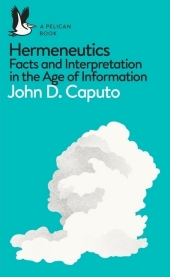 Neuerscheinungen 2018Stand: 2020-02-01 |
Schnellsuche
ISBN/Stichwort/Autor
|
Herderstra▀e 10
10625 Berlin
Tel.: 030 315 714 16
Fax 030 315 714 14
info@buchspektrum.de |

John D. Caputo
Hermeneutics
Facts and Interpretation in the Age of Information
2018. 368 S. 181 mm
Verlag/Jahr: PENGUIN UK; PELICAN 2018
ISBN: 0-241-25785-9 (0241257859)
Neue ISBN: 978-0-241-25785-2 (9780241257852)
Preis und Lieferzeit: Bitte klicken
Is anything ever not an interpretation?
Does interpretation go all the way down?
Is there such a thing as a pure fact that is interpretation-free? If not, how are we supposed to know what to think and do?
These tantalizing questions are tackled by renowned American thinker John D Caputo in this wide-reaching exploration of what the traditional term ┤hermeneutics┤ can mean in a postmodern, twenty-first century world. As a contemporary of Derrida┤s and longstanding champion of rethinking the disciplines of theology and philosophy, for decades Caputo has been forming alliances across disciplines and drawing in readers with his compelling approach to what he calls "radical hermeneutics." In this new introduction, drawing upon a range of thinkers from Heidegger to the Parisian "1968ers" and beyond, he raises a series of probing questions about the challenges of life in the postmodern and maybe soon to be ┤post-human┤ world.┤
Praise for Truth: Caputo┤s entertaining investigation into the nature of truth . . . sets out his case confidently, enlisting Nietzsche, Kierkegaard and Derrida as his allies. (His explanation of Derrida┤s thought is one of the clearest that I┤ve read.) . . . The starting point for a more sophisticated discussion David Wolf Prospect
Caputo, John D.
John D. Caputo is a specialist in contemporary hermeneutics and deconstruction with a special interest in religion in the postmodern condition. The Thomas J. Watson Professor of Religion Emeritus at Syracuse University and the David R. Cook Professor of Philosophy Emeritus at Villanova University, he has spearheaded an idea he calls weak theology.


